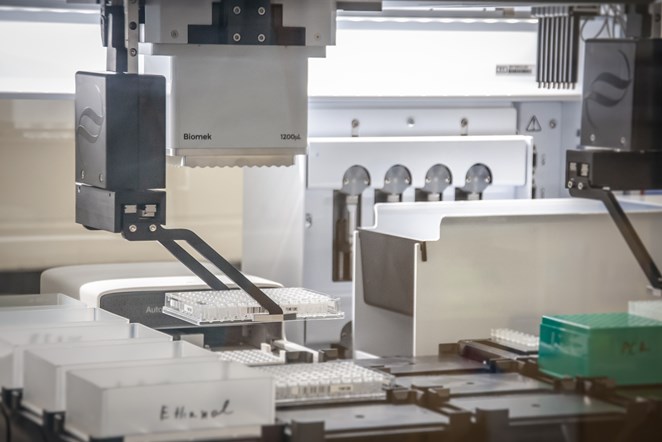- Position
- Professor, Biochemistry and Molecular Medicine
- Phone
- 304-293-6334
WVU Rapid Development Laboratory

The WVU Rapid Development Laboratory (WVURDL) was established in 2020 with support from the State of West Virginia to provide the technical and professional support to develop, validate and implement complex diagnostic testing for SARS-CoV-2, the virus causing COVID-19. The WVURDL is certified by the Clinical Laboratory Improvement Amendments (CLIA-certified), meaning it meets and exceeds federal industry standards for lab testing.
The mission of the WVURDL is to assist the State's efforts in fighting COVID19 by developing clinical assays, performing clinical testing and developing vaccines. The RDL is supervised by Dr. Peter Perrotta (Chair of the Department of Pathology, Anatomy & Laboratory Medicine at WVU) and encompasses a molecular laboratory led by Dr. Peter Stoilov and an immunological laboratory led by Dr. Heath Damron.
The molecular laboratory is located in five adjacent rooms and two office spaces on the second floor of the WVU Health Sciences Center (HSC), compartmentalized to separate clean spaces from sample handling areas and areas containing amplification equipment. Major equipment includes centrifuges, two biosafety cabinets, five PCR clean benches, four real time thermocyclers, two 96 well and one 384 well block thermocyclers, an Agilent TapeStation 4200, and two Beckman Biomek i7 automated liquid handlers configured to perform automated RNA extraction, PCR assays, and preparation of libraries for Next Generation Sequencing. Refrigerators and freezers (−20 °C and −80 °C) provide separated storage spaces for template free reagents and samples. The RDL has direct access to two Illumina sequencers, MiSeq Dx and NextSeq 550 Dx, that are operated under the supervision of the WVU Medicine Molecular Diagnostics Laboratory. The immunological laboratory occupies a single lab space with attached storage and office space. Major equipment includes plate dispensers, plate washers, two Tecan liquid handlers configured for high throughput immunoassays, centrifuges and refrigeration equipment.
The research team is comprised of doctorate-level faculty and technical staff who are virology experts, and a laboratory medicine team, which includes medical and doctoral faculty, laboratory technologists, and administrative staff. There are three main types of diagnostic tests that currently detect SARS-CoV-2. The first utilizes molecular techniques (eg, PCR) to detect the virus’ genetic material. The other is an antibody test that can detect antibodies directed against SARS-CoV-2 developed in response to COVID-19 infection or vaccination. The WVURDL also performs sequencing of SARS-CoV-2 in order to detect variants of this virus that enter WV.
Square Footage (includes all rooms within the space):
- RM 2317 PCR Testing: Total 600 sq. ft.
- RM 2323 Sequencing Testing: Total 360 sq. ft.
- RM 2156 ELISA Testing: Total 911 sq. ft.
- Positions
- Associate Professor, WVU Cancer Institute Research Laboratories
- Associate Professor, Microbiology, Immunology & Cell Biology
- Member, WVU Cancer Institute Research Programs
- Phone
- 304-581-1934
- Position
- Professor and Vice Chair, Department of Pathology, Anatomy & Laboratory Medicine; Director of Pathology Services, WVU Health System, Pathology, Anatomy and Laboratory Medicine
- Phone
- 304-293-1617
- Positions
- Associate Professor and Director of the Vaccine Development center WVU-Health Sciences Center, Microbiology, Immunology & Cell Biology
- Director, MD-PhD Program, Research & Graduate Education
- Phone
- 304-581-1754
- Positions
- Res. Assistant Professor, Biochemistry and Molecular Medicine
- Member, WVU Cancer Institute Research Programs
- Phone
- 304-293-4936
- Position
- Professor, Director, Clinical Chemistry, Pathology, Anatomy and Laboratory Medicine
- Phone
- 304-598-4243
- Position
- Pathologist, Pathology, Anatomy and Laboratory Medicine
- Position
- Pathology, Anatomy and Laboratory Medicine
- Positions
- Associate Professor, Pathology, Anatomy and Laboratory Medicine
- Member, WVU Cancer Institute Research Programs
- Phone
- 304-293-3404
- Position
- Technical Specialist, Pathology, Anatomy and Laboratory Medicine
- Phone
- 304-293-0287
- Position
- Pathologist Assistant, Pathology, Anatomy and Laboratory Medicine
- Phone
- 304-293-1635
- Position
- Director of Research, Emergency Medicine
- Phone
- 304-293-1326
- Position
- Department Administrator, Pathology, Anatomy and Laboratory Medicine
- Phone
- 304-293-0782
- Position
- Accounting Assistant 1, Pathology, Anatomy and Laboratory Medicine
- Phone
- 304-293-7594